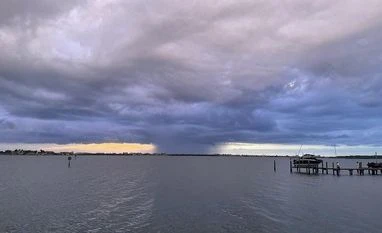People trapped, 2 mn without power after hurricane Ian swamps SW Florida
Hurricane Ian left a path of destruction in southwest Florida, trapping people in flooded homes, damaging hospitals and knocking out power to 2 million people before aiming for the Atlantic Coast
)
Hurricane Ian (Photo: Twitter)
Hurricane Ian left a path of destruction in southwest Florida, trapping people in flooded homes, damaging the roof of a hospital intensive care unit and knocking out power to 2 million people before aiming for the Atlantic Coast.
One of the strongest hurricanes to ever hit the United States barrelled across the Florida peninsula overnight on Wednesday, threatening catastrophic flooding inland, the National Hurricane Centre warned.
The centre's 2 am advisory said Ian was expected to emerge over Atlantic waters later on Thursday, with flooding rains continuing across central and northern Florida.
In Port Charlotte, along Florida's Gulf Coast, the storm surge flooded a lower-level emergency room in a hospital even as fierce winds ripped away part of the roof from its intensive care unit, according to a doctor who works there.
Water gushed down onto the ICU, forcing staff to evacuate the hospital's sickest patients -- some of whom were on ventilators to other floors, said Dr. Birgit Bodine of HCA Florida Fawcett Hospital.
Also Read
Staff members used towels and plastic bins to try to mop up the sodden mess.
The medium-sized hospital spans four floors, but patients were forced into just two because of the damage. Bodine planned to spend the night there in case people injured from the storm arrive needing help.
As long as our patients do OK and nobody ends up dying or having a bad outcome, that's what matters," Bodine said.
Law enforcement officials in nearby Fort Myers received calls from people trapped in flooded homes or from worried relatives. Pleas were also posted on social media sites, some with video showing debris-covered water sloshing toward homes' eaves.
Brittany Hailer, a journalist in Pittsburgh, contacted rescuers about her mother in North Fort Myers, whose home was swamped by 5 feet (1.5 metres) of water.
We don't know when the water's going to go down. We don't know how they're going to leave, their cars are totalled, Hailer said. Her only way out is on a boat.
Hurricane Ian turned streets into rivers and blew down trees as it slammed into southwest Florida on Wednesday with 150 mph (241 kph) winds, pushing a wall of storm surge.
Ian's strength at landfall was Category 4 and tied it for the fifth-strongest hurricane, when measured by wind speed, to ever strike the US.
Ian dropped in strength by late Wednesday to Category 1 with 90 mph (144 kph) winds as it moved overland.
Still, storm surges as high as 6 feet (2 metres) were expected on the opposite side of the state, in northeast Florida, on Thursday.
The storm was about 55 miles (90 km) southwest of Orlando with maximum sustained winds of 75 mph (120 kph) at 2 am on Thursday, the Miami-based hurricane centre said.
A hurricane warning remained in effect north of Bonita Beach, about 31 miles (50 km) south of Fort Myers, to Anclote River including Tampa Bay and from Sebastian Inlet to the Flagler/Volusia county line.
The centre discontinued a hurricane warning between Bonita Beach and Chokoloskee. A tropical storm warning from Chokoloskee to Flamingo on the state's southwest tip also was discontinued.
Hurricane-force winds were expected across central Florida through early Thursday with widespread, catastrophic flooding likely, the hurricane centre said.
No deaths were reported in the United States from Ian by late Wednesday.
But a boat carrying Cuban migrants sank on Wednesday in stormy weather east of Key West.
The US Coast Guard initiated a search and rescue mission for 23 people and managed to find three survivors about two miles (three kilometres) south of the Florida Keys, officials said.
Four other Cubans swam to Stock Island, just east of Key West, the US Border Patrol said. Air crews continued to search for possibly 20 remaining migrants.
The storm previously tore into Cuba, killing two people and bringing down the country's electrical grid.
The hurricane's eye made landfall near Cayo Costa, a barrier island just west of heavily populated Fort Myers. As it approached, water drained from Tampa Bay.
More than 2 million Florida homes and businesses were left without electricity, according to the PowerOutage.us site. Nearly every home and business in three counties was without power.
Sheriff Bull Prummell of Charlotte County, just north of Fort Myers, announced a curfew between 9 pm and 6 am for life-saving purposes, saying violators may face second-degree misdemeanour charges.
I am enacting this curfew as a means of protecting the people and property of Charlotte County," Prummell said.
The Weather Underground predicted the storm would pass near Daytona Beach and go into the Atlantic before veering back ashore in South Carolina on Friday.
The governors of South Carolina, North Carolina, Georgia and Virginia all preemptively declared states of emergency.
Forecasters predicted Ian will turn toward those states as a tropical storm, likely dumping more flooding rains into the weekend.
(Only the headline and picture of this report may have been reworked by the Business Standard staff; the rest of the content is auto-generated from a syndicated feed.)
More From This Section
Don't miss the most important news and views of the day. Get them on our Telegram channel
First Published: Sep 29 2022 | 3:34 PM IST
